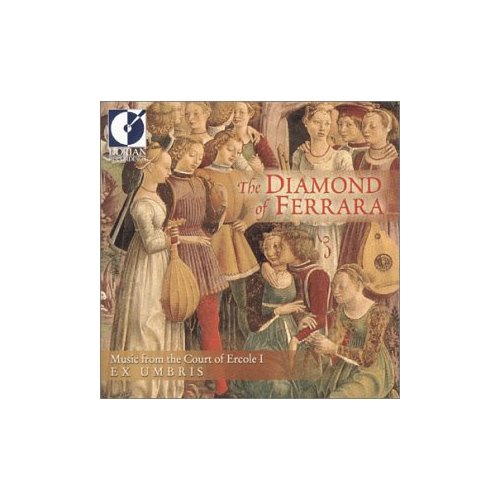I have no idea where or why I bought this CD but a recent archaelogical dig, in my alleged dining room, unearthed this shining treasure. THE DIAMOND OF FERRARA Ex Umbris, subtitled “Music from the Court of Ercole I”
Ercole d’Este was born in 1431 and was Duke of Ferrara from 1471 to 1505. His son became the second husband of Lucrezia Borgia and his other connections read like a 15th century Who’s Who. Ercole was a patron of all the arts, a sort of cross between Prince Charles and Andrew Lloyd Webber. The blurb inside the CD case says that Ercole and his rellies had a fancy that they were descended from the legendary hero Rugiero “and even named many of their children after characters in the Carolingian romances”. As far as I can make out, this Carolingian stuff all came about well before 1066 and split three ways into what would later become France, Germany & Italy. It does indeed sound like a version of the archetypal story where the three sons go off to seek their fortune or the kingdom is divided between them . Somewhere in this Carolingian stew is Pepin Heristal, a name I came across years ago in a thin book by John Steinbeck called “The Short Reign of Pippin IV”. For those of you with some knowledge of Carolingian history you may see a joke in the title of the book. Oh by the way “Carolingian” means “descended from Charlemagne”.
“The diamond of the title refers to an insignia of the Este family” and also to one of the oieces on the Cd “O triumphale diamante” a piece commissionned for the wedding of Ercole’s son, Alfonso to Lucretia Borgia. The CD has a varied selectionof pieces, some secular, some religious, some poetry set to music and some dances. This Cd has the power to relax and lift up at the same time. I must confess to turning up the volume so I could and be soothed by it whilst soaking in a luxurious scented bath before floating into a welcoming bed atthe end of a hard day at work. Oh and there is a touch of humour as well as we hear about the exploits of Scaramella, a 15th century lad who swaggers around, falls in love, goes off to war and sails “in a galley so he can kiss a jewess”.

Leave a comment